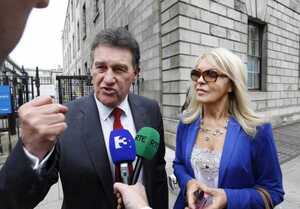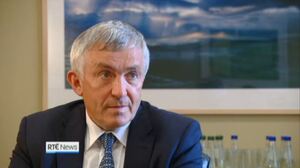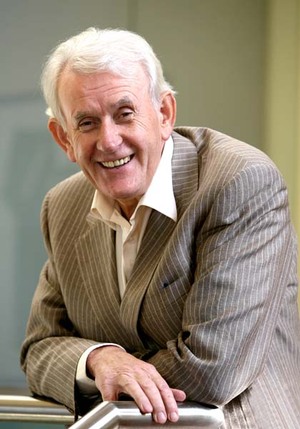
Not them.
The developers.
Ian Kehoe (right), of The Sunday Business Post, appeared on RTE 1’s The Saturday Night Show with Brendan O’Connor (left) to discuss three debt-drenched former property moguls: Bernard McNamara, Derek Quinlan and Sean Dunne – and what they’re up to now.
It was sobering viewing.
Luckily we had a bit o’ smoke.
Brendan O’Connor: “We’re going to look at a few of the bigger players and the more colourful guys tonight. All of them – people who skipped the country.”
Ian Kehoe: “People, who’ve left the country.”
O’Connor: “OK. So. Starting with Bernard McNamara, who is he? Where did he come from?”
Kehoe: “Yeah, Bernard McNamara was I suppose ubiquitous during the boom. He was everywhere, from hotels to property plays all over the country. He invested and built and bought literally everything. He’s from Lisdoonvarna, in Clare, very close to Fianna Fail, served two terms as a councillor down in Clare, in Lisdoonvarna, ran for the Dáil, didn’t get it, moved to Dublin, picked up an awful of State work. But then, I suppose like an awful lot of builders, decided there was an awful lot of money to be made, developing the properties themselves. And that led him getting into things like The Shelbourne Hotel, The Conrad, Parknasilla down in Kerry, literally everywhere down the country he bought or built something.”
O’Connor: “OK. And then of course, probably very well known for being involved in the Glass Bottle site, that fiasco. But there was a, probably his most ambitious project is a thing that a lot of people might know about and that’s being involved, basically taking over parts of the city centre in Dublin.”
Kehoe: “Absolutely, it is. It was probably kind of his grand plan, but he never came out and said it. Essentially, he snapped up dozens and dozens of properties in Grafton Street, in around the Westbury area of Grafton Street [Dublin]. And his idea was to create a brand new thoroughfare, right through that area onto George’s Street, full of shops, apartments, residential areas, cinemas, hotels. And, literally, if you look on NAMA’s list of receiverships, you will just literally see scores of various Bernard McNamara properties. Little houses, shops. And his grand plan was literally to buy everything, to go right down the middle. Now all of those properties are for sale in the great asset sell-off.
O’Connor: “OK. So Bernard McNamara is all his stuff basically in NAMA now?”
Kehoe: “A large, a large chunk of it is.”
O’Connor: “How much did he end up owing?”
Kehoe: “He owes NAMA, through the various banks, €1.5billion. And another €500million to various, non-NAMA banks, which would bring him in at about €2billion all told.”
O’Connor: “OK. Now, he is now bankrupt, yes?”
Kehoe: “Yeah, I suppose, he followed an awful lot of people. He went to London and at the start of November, declared bankrupt in the London courts. I suppose it’s a different type of bankruptcy then an awful lot of people might associate with in Ireland. He’s living in a house, for example, in London that costs £6,000 sterling a month, in a little gated community, you have to press an intercom bell to get in. He’s also establishing himself in the property market, and set up a company. He’s also doing a lot of consultancy work in Nigeria, in Lagos of all places. And there are some reports he’s doing some stuff in South Africa.”
O’Connor: “So life goes on for Bernard. And we’re not going to see any of our billion and a half or much of it…?”
Kehoe: “Well, essentially, he walks away from the debts, in one year’s time, next November, he’ll walk away with a clean slate. And free to start again.”
O’Connor: “OK. Derek Quinlan, different kettle of fish to a lot of these guys was Derek Quinlan. He was a tax inspector and then became a kind of financial guru to the great and the good?”
Kehoe: “Yeah, he was a kind of poacher-turned-gamekeeper, I suppose. Got out of the Revenue Commissioners as a special investigator and started assembling syndicates of high net-worth individuals. And he’d gather up the money and then he’d invest them in tax-driven property plays. So he’d started off in Ireland, financing things like car parks and hotels and small things. But his ambitions grew and he literally looked around the world and saw some of the biggest, most fantastic property plays and followed through with them. In 2008, he spent €1.8 billion of his own and his investors’ money buying a building, the Santander building in Spain. He outbid Saudi princes for The Savoy and The Connacht Hotel, over in London. Literally, billions, big ticket stuff.
O’Connor: “OK. So big, international prestige kind of stuff. And I suppose unlike a lot of the guys aswell, he was using a lot of punters’ money, like not just bankers’ and there was some well-known people in there.”
Kehoe: “Absolutely, I mean his client list was like the who’s who of Ireland. You had everyone from, over the years, people like Moya Doherty, JOhn McColgan, of Riverdance, invested in him. An awful of people, Gay Byrne, Pat Kenny invested an awful lot of money with them.”
O’Connor: “And have all those people lost their money now?
Kehoe: “Well a certain amount, I saw Pat Kenny recently came out and said he had certainly taken a bit of a hiding in it. And others have aswell, I suppose like everything, you invest in property, it’s not a one-way bet. But certainly the scale of the ambition of what he was doing was unprecedented in Irish terms.”
O’Connor: “So if you buy buildings for €1.5billion and this, how much does he owe now?”
Kehoe: “His total ownings…He was numero uno when the loans got transferred to NAMA. Debts linked to him, and associated with him, totalled…”
O’Connor: “The syndicates…”
Kehoe: “Yeah, the syndicates, that all went wrong, was €3billion. His personal quote of that was about €600million. In an effort to get back some of that money, NAMA appointed receivers, over nine or ten of his properties, including a place in Shrewsbury Road. I mean it was always said you were somebody in Ireland if you had that Shrewsbury Road property. Derek Quinlan had three of them, which will give you a scale of what he was up to.”
O’Connor: “And, but Derek Quinlan, in fairness to him I suppose, is attempting to pay back the money, he hasn’t gone into bankruptcy.”
Kehoe: “No, no, he has left Ireland. He’s based between an idyllic hamlet over in Switzerland and a £20,000-a-month house over in London. But he is selling assets continually and paying down his debts. So I think he’s paid off his, somewhere close to €2billion in an effort to, you know, restructure his finances. But he’s said himself, his own personal finances at this stage are very precarious. And he is being bankrolled by various people who took a shine to him.”
O’Connor: “The Barclay brothers and all that. I want to ask you about one particular asset of his which was incredible. That house in Cap Ferrat. We’ve a picture of it there. It’s amazing. That house was originally bought for how much? Or how much did he buy it for?”
Kehoe: “It was €40million or €50million. It was ultimately sold at a massive discount, in around €13million or €14million, when he eventually went to sell it.”
O’Connor: “And that was just his own gaff for when he went on holidays.”
Kehoe: “That was it. Literally, he had a portfolio in the South of France. I don’t think you had a picture of it there. But he had a fabulous yacht, stationed not too far away from that, he had phenomenal properties over in London. He still has them. Houses all around Ireland. He literally lived the high life. It was very interesting. I suppose one of the defining quotes in the boom, it was put to him ‘Given the scale of his debts, in a court action in London, of which he was a third-party to and how come he was able to maintain such an extravagant lifestyle, looks directly back at the lawyer and said ‘Well, extravagance is an unusual term. What’s extravagant to one, mightn’t be extravagant to me.’ So that was his take on his own thing.”
O’Connor: “Not bad for a fella who came from the tax office.”
Kehoe: “Absolutely.”
O’Connor: “We’ll move to Sean Dunne, Dunner. Of course Gayle and Sean were of course held up as the poster couple of the boom and all that. Tell us about that.”
Kehoe: “Yeah, they certainly were. They were high-profile. Sean Dunne, from Tullow, started off working on sites, but he moved fast, very quickly, beyond all of that. I mean he will forever be known with spending €375million buying up two sites in Ballsbridge in Dublin 4.”
Later
O’Connor: “So listen, between the three of those say, that’s just three and you know, there’s so many other huge guys who haven’t been mentioned, the Johnny Ronans…Those three, how much do those three owe the State, through NAMA? How much are their debts?”
Kehoe: “All told their debts are about €6billion. And then the NAMA portion of that would be €4.5bn to €5bn.”
O’Connor: “OK. So, bigger than an austerity budget.”
Kehoe: “Well bigger than the adjustments. We heard all about the biting cuts and the austerity in the last budget. And that was €3.5billion. But to get that sort of money back. I mean, it just puts it into context. The mammoth borrowings that all of these guys had.”
O’Connor: “Of course, we’re not getting it back.”
Kehoe: “No. I don’t think so. I mean, even best-case scenario, if you look at it, €72 billion transferred to NAMA, €62 billion of that, €62 billion of that alone was from 180 borrowers. That’s roughly what you’d have at medium-sized country wedding. So the next time you’re at that wedding, look around and say to yourself ‘these are the NAMA people who owe €62 billion. Best case scenario, of that €62billion, we get back €25 billion.”
Watch here














